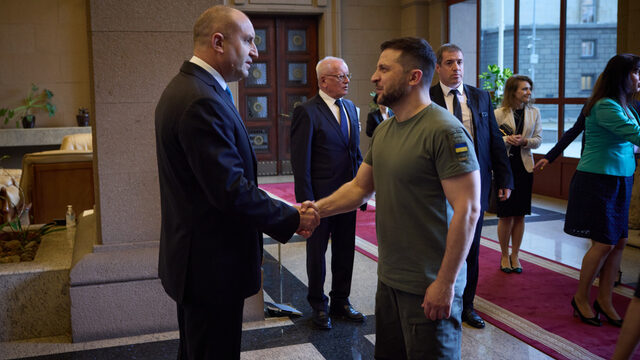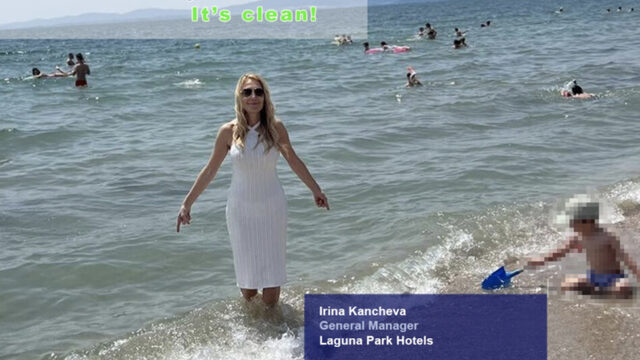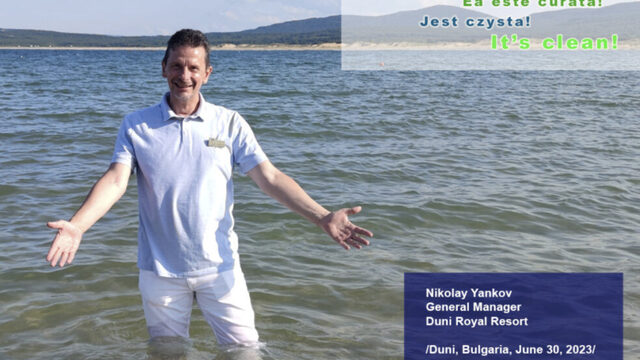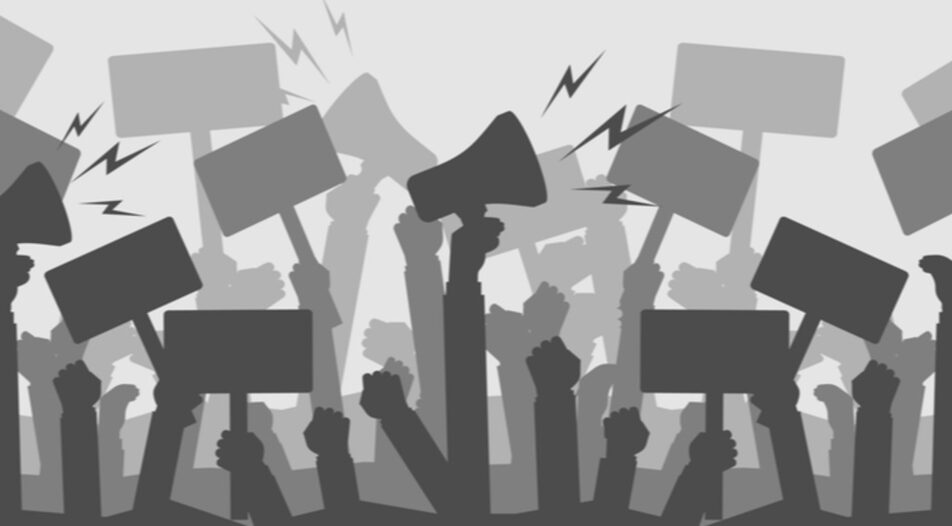How's that for an unexpected week: Zelensky's here, we're selling him some nuclear reactors, Borissov gave up on his immunity and Prigozhin is back in Russia. We will talk about some of those things, of course, but first let me get to something I think is intrinsic to understand how the Bulgarian public functions.
Recently, there was a new opinion poll by Eurobarometer in those countries which have not adopted the euro. It showed a virtual dead heat in Bulgaria: 49% of people were "for" adopting the common currency and 49% were against it. That's rather surprising given that the campaign against the euro was peaking this month, with the call for a referendum by Vazhrazhdane party (sidelined by Parliament).
But wait a moment, because there's more to this than meets the eye. Another question was whether people believed the euro would have negative or positive consequences for Bulgaria. Here, 51% said it would have negative effects, and 43% said it would have positive ones. Which means, basically, that there is a percentage of people who either don't know or believe the euro is not-beneficial but still would like to implement it, and some who think it's not, but would still like to reject it.
Confused by that, I went to the last public poll, conducted by Eurobarometer, back in January. The field work is only several months apart. There, it's clearly stated that 49% of people in Bulgaria were against the common currency, yet only 36% were "for". That's a huge gap for a couple of months. How did 13% of people get convinced that the euro is good for the country in just 4 months, given that there is no campaign in favor and a large movement against?
Another of the questions from the January poll might offer an insight. A full 80% of the people believed the economic situation in Bulgaria was bad and 60% believed the employment situation was bad. Mind you, that's at the end of a year which marked the highest inflation rate in a decade, but with the highest salary growth, in an economy that keeps on growing despite everything, and with the lowest unemployment rate on record. Eighty percent !!
Most people are obviously very confused.
Be it because of news day-in-day out, or stuff on social media, or just because of inertia and general feeling of being lost in what's going on. They can evaluate their own situation, but fail to transport that into the general picture. For example, 54% of the people say their own employment situation is good or very good, and 50% say the financial situation in their household is good.
So there: basing any policy decision on "what people think or want" is a very slippery concept, because a lot of people swing either way in a short period of time. They know what they want for themselves, their family or at the most - their city. They are easily shaped by narratives and tend to always err on the worse side.
To me, this is actually a relief. Because low expectations are an easy bar to clear for any sensible political leadership and there is actually a huge swing vote. But there is obviously a dark side to this concept.
This newsletter is helped by
Martin Dimitrov & Monika Varbanova

Politics this week:
He came, he saw, he slapped RadevUkrainian president Volodymir Zelensky and his team arrived in Sofia for a short visit. The security around it was tight, as any secrecy had been blown away days before when some media announced the visit. Zelensky met the cabinet and some party leaders but he also got to meet the President.
It would have been uncomfortable for Rumen Radev to stay on the sidelines, so he did something else: invited the guest and put him live on TV to tell him he doesn't support sending ammo and asking him what he thinks peace would look like. After a year of being a war leader, however, Zelensky had the stamina and experience to shame Radev publicly, responding that "the whole of Bulgarian ammo won't suffice if you'd fight the Russian federation, so you'd be wiser to send us more, instead of the war coming to you". This is the biggest public humiliation I've seen the President suffer since his war with the prosecution.
Radev closed the meeting to journalists after that.
Would you happen to have Russian nuclear reactors?
The visit of Zelensky, however, was accompanied by a deal. Turns out, Ukraine is probably the only country which currently needs Russian-made nuclear reactors of the old type VVER A92. The country has an old design NPPs and energy needs since Russia took control of some of the network and plants. While it obviously can't get any more Russian-made reactors, it is on the lookout for some. And Bulgaria, as luck has it, owns 2 of those.
We bought them years ago for Belene NPP and even though we wanted to terminate the contract, Rosatom won the arbitration and made us pay them - around 600 million euro. They are literally conserved on the Belene pad, covered and ready to be shipped. We tried selling them (on a discount) to various countries. Now, it seems, Ukraine is willing to pay the full price. Parliament voted in favor of the proposal, put forward by GERB and WCC/DB and the deal will soon be concluded, putting an end to the long and corrupt chapter of Belene.
Just a month ago, Rumen Radev's caretaker cabinet was talking about reviving the project, and an official visit to the site was even organized, where former energy minister Rosen Hristov hinted at French EDF's involvement. Read the whole story in Evgeni Ahmadzai's piece here.
Oh, and also in parliament: Borissov gives up immunity
They created a whole committee to discuss how to give up the ex-PM's immunity. It was obviously a trick to kill the investigation into Barcelonagate. On Wednesday, Borissov himself stated angrily that he would not give up his immunity "to Geshev's classmates," referring to the prosecution service.
Yet an hour later, the GERB chairman played his favorite trick - completely reversing his position: "After all, I am Boyko Borissov. I will give my immunity. I will not be a victim of blackmail."
If you wonder why that is
The investigative reporting website BIRD.bg gave a possible explanation, posting a screenshot of an ordinance by current Prosecutor General Borislav Sarafov that demanded all materials under the Barcelonagate case arrive at his office Sarafov is a long-standing GERB ally and will hardly create trouble for Borissov in the near future. Which means GERB bets on not reforming the leadership of the Prosecution service in the next few months, until Borissov feels secure enough, or the government falls.
Economy:
The eternal BNB governor remainsThe race to find a new boss of the Bulgarian National Bank (BNB) in the next six years turned out to have been a foregone conclusion. The incumbent governor Dimitar Radev is almost guaranteed to keep his post for another six-year term, since his first mandate has already been extended by almost 3 years. Two days before the deadline for nominations, none have yet been published on the National Assembly website, but GERB announced at the start of the procedure that it would nominate the current governor. WCC-DB, on the other hand, had stated that they would put up their own candidate against him, but according to Capital weekly sources, the coalition's latest decision is to support Mr Radev. It is likely that the MRF will also vote for him.
But who's next?
Thus, the main intrigue shifts to the election of sub-governors, two of whom also have expired mandates. Likely nominees are MRF's Petar Chobanov, who used to be the Finance Minister in the notorious Oresharski cabinet, as well as MPs Georgi Ganev (DB) and Andrey Gyurov (WCC).
Figures
9.5%
Is the real estate price growth in Bulgaria in the first quarter of 2023, which is 10 times the EU average.
2
Business
SolarAmonRa Energy
The solar panel trader hands out a 5 million levs dividend, which is a rather spectacular feat for a company traded on the Bulgarian BEAM stock exchange. This is 80% of the profit for 2022 and is a 6% yield.
Telecoms
VIvacom
The leading Bulgarian telecom received permission from the Competition Commission to acquire smaller ISP and TV providers in Veliko Tarnovo and Russe. This prompted an angry reaction from the other two players - A1 and Yettel, which claim that Vivacom's recent deals aim at achieving 60% share of the TV market and 40% share of the ISP market. Vivacom responded that those figures are "misleading and untrue".
ENERGY:
A sunny monthJune was the month with the highest share of renewable energy in the Bulgarian energy mix to date. This came in the same month when coal powered plants crumbled to 17% of the mix - their lowest ever.
Brussels
How does a rose smell? The Committee of Permanent Representatives COREPER 1 decided last week that rose oil as well as other essential oils won't be included in the revised regulation on Classification, labelling and packaging of chemicals that carry potential health risks. This means that Bulgarian rose production will be free from additional expenses as well as image-destroying labels.
However, in the two upcoming weeks the debates continue in the European Parliament. A final decision is expected by the end of October.
We won't monitor you, but we see you
The Commission has initiated the official removal of the monitoring for Bulgaria and Romania (a small step to support the accession of the two countries into Schengen). However, the Rule of law 2023 report still points at a serious amount of unfinished reforms in the country. Bulgaria is criticized again over unresolved problems with the composition of the High Judicial Council and its Inspectorate, etc.
EU Green deal at higher cost
The EU needs to invest an additional €700 billion a year to make the economy green and shut out cheap Russian fossil fuels, according to a published report from earlier this week. This comes at a time of extreme reluctance from business and politicians over new green legislation and the finalization of the contradictory report of nature restoration (which according to some would be unbearable for small farmers in Europe).
Watch out for:
People:Julian Popov
The environment minister plans to create a national fund for buying up private lands in parks and beaches to deal with a longstanding issue for municipalities.
Teodora Petkova
The head of Unicredit Bulbank and East European division in the group is taking over the operations in Central Europe. Petkova will oversee 11 countries, Austria, Czech republic and Hungary included.
Company:
National Health Insurance Fund
Which oversees 7 billion levs annually and all the hospitals in the country, is to get a new head. The current frontrunner however, is a bit problematic. Ivanka Dineva - GERB's nomination got fired from her position as Sofia health fund director last year over disciplinary charges.
Word of the week
Чисто е! - It's cleanAs a Bulgarian hotel manager, you'd have plenty of responsibilities. But posing in your Sunday best, knee-deep in the (supposedly) Black Sea waters would hardly be one of them. Unless, you want to demonstrate how clean it is, in a nationwide campaign on a clearly photoshopped background.


How's that for an unexpected week: Zelensky's here, we're selling him some nuclear reactors, Borissov gave up on his immunity and Prigozhin is back in Russia. We will talk about some of those things, of course, but first let me get to something I think is intrinsic to understand how the Bulgarian public functions.
Recently, there was a new opinion poll by Eurobarometer in those countries which have not adopted the euro. It showed a virtual dead heat in Bulgaria: 49% of people were "for" adopting the common currency and 49% were against it. That's rather surprising given that the campaign against the euro was peaking this month, with the call for a referendum by Vazhrazhdane party (sidelined by Parliament).












